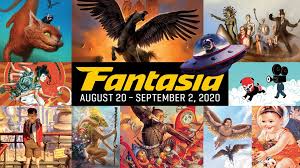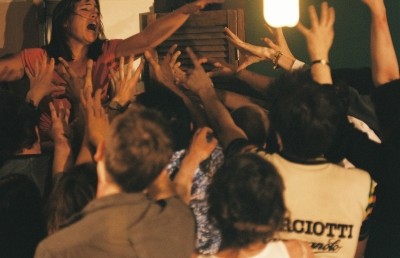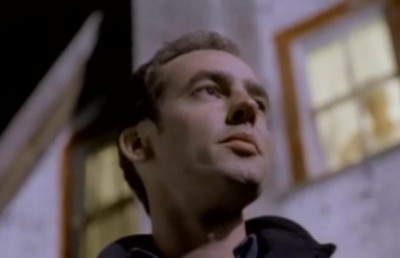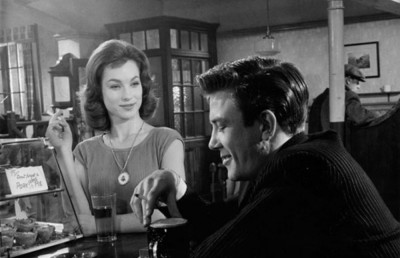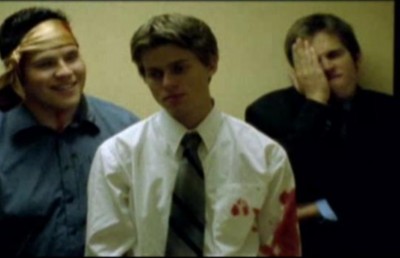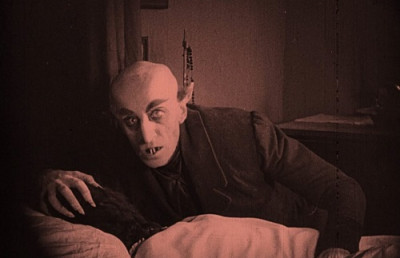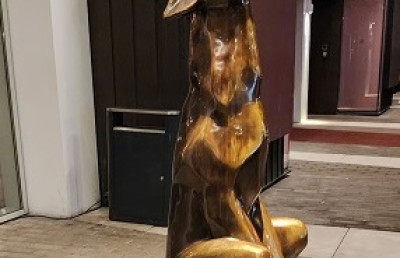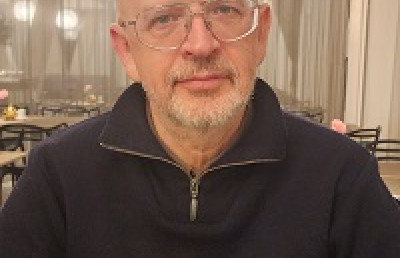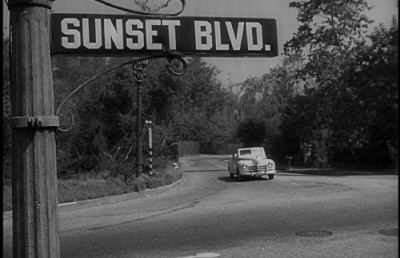Death in Ventnor Interview
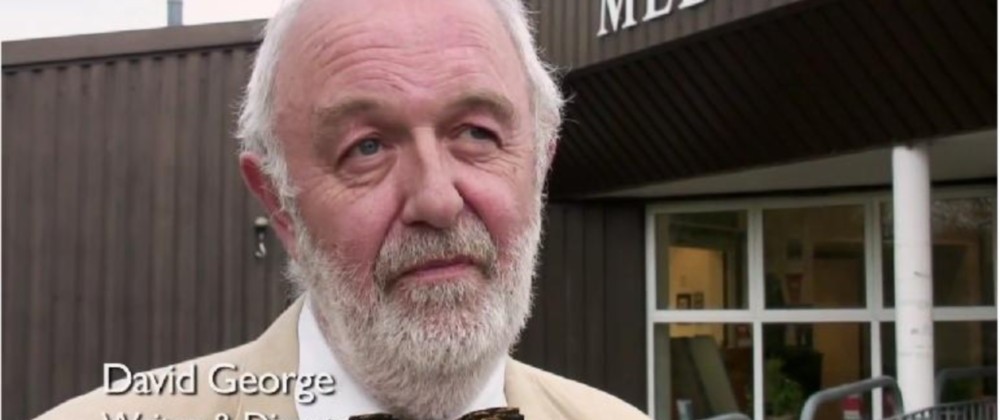
Death in Ventnor is a small budgeted, locally (Ventnor, Isle of Wight, England) made gangster comedy that has its heart in the right place. A copy of the film was sent to me by the director David George and I was smitten by its off-the-wall charm and gentle humour. I reviewed it for Offscreen and became intrigued to learn more about the making of the film, so got in contact with George and suggested an interview. The following is the resulting interview conducted by email, with David George and the DP David White.
Background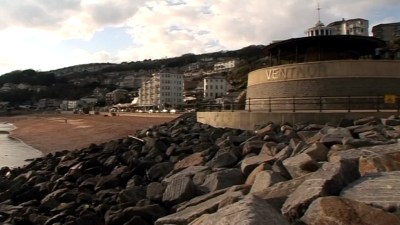
Offscreen: Maybe we can start with some background on you, as an actor, and Utility Films, the production company. I imagine your training is in theatre. Where did you act, and is this your first film role?
David George: I worked as an actor having studied drama at the Guildhall School of Music and Drama, London. Initially I did a lot of community theatre often as an actor/writer. I worked extensively in television but did little film. In the 1980’s I became a member of the National Theatre Company working with directors like Peter Hall and Alan Ayckbourn. In 1994 I moved with my young family to the Isle of Wight and spent five years working with young people coming out of the care system. I started Utility Films having made a short film about the experience of leaving care with a number of my clients. Things took off from there and I’ve made a number of commissioned projects in the intervening years.
Offscreen: I know that the claim the budget for the film is 2000 pounds, which seems really low for a feature film, even if it is digital. How the heck did you make a feature on such little money!
DG: £2000 was all we had! We made it absolutely clear to everyone that no one would be paid and there would be no deferments. Many of those involved had worked for Utility Films before and I think we were trusted. I was keen that there was a collective sense of ownership, and everyone bought into that. In terms of where we spent the budget, it’s very prosaic; tape, petrol, food. We couldn’t really waste money as there was no money to waste, which makes for an interesting production. Anything we needed we either made or borrowed.
Offscreen: You’ve said that the film is really a “community film.” Can you elaborate on what sort of practices or sacrifices that the people of Ventnor did to help make the film a reality?
DG: I suppose that all films, or theatre productions for that matter, are community projects inasmuch as a group of people come together, create something and then go on to other things. David White (DOP) recently described the experience of making Death in Ventnor as ‘catching lightening in a bottle’ and I really think that sums it up; we were very, very lucky. Take locations. Most post office owners would emphatically not let you take over their place, ram it full of cast, crew and equipment and then wave guns around and pretend to rob the place. However we knew the owners and when I rather tentatively suggested we might do this they just thought it would be a great laugh and said “sure, when do you want to do it?”, try doing that in the middle of London!
Similarly the children’s residential home in the film is actually an outdoor activity and conference centre called East Dene (home of the poet Swinburne) which is ten minutes walk from my house. Again the owners were great and virtually gave us the run of the place. Ultimately it always comes down to the people involved. Wayne Child, who plays Billy, was extraordinary. We’d worked on a couple of projects before and I wrote the part for him. In return Wayne, who’s the best connected person I know on the Isle of Wight, and who is actually a bank manager, became the ultimate problem solver. His mantra was “Leave it to me, I know someone” and so I did, and he always came up trumps. Everyone involved was remarkably generous. People from all walks of life contributed to the film. In the cast we had teachers, musicians, paramedics, ex policemen, stand-up comedians, other film makers, and they all gave up days and days of their time, and I think they all enjoyed themselves a lot.
Offscreen: How did the actual idea of making a gangster comedy on location in Ventnor come about?
DG: If I’m honest the name came first. So we had to use Ventnor, and I live here, so why not make the film here? We shot a little in Southampton but all the rest was filmed on the Isle of Wight, which is a beautiful place and as nowhere is more than forty minutes away so it’s easy to work in.
Offscreen: How was the film received when it played in Ventnor?
DG: We’ve shown the film here twice and it’s been very well received. They’ve been partisan audiences in a way, you could feel them willing the film on, but we’ve also shown it on the mainland and it’s been equally well received.
Offscreen: Where else has the film played? What is in store for the film? Any DVD release in the future?
DG: We showed at Southampton Film week and also at the New Park Cinema, Chichester. We will be doing the rounds of film festivals I hope and will put the DVD on sale to help fund the next project which is Agenda Item 5, a comedy/horror, also to be shot on the Island.
GenreOffscreen: How do you see your little film fitting in with the many other British gangster films that have surfaced over the past ten or so years (lock, stock and two smoking barrels, Croupier, Snatch, Sexy Beast, etc.)? Were you aware of these other films? If so, are there any that influenced you, directly or indirectly?
DG: I’ve seen most of the films you mention, Performance I think is one of the greatest British films ever made, but of gangster movies my personal favourite is Get Carter. I don’t really think of Death in Ventnor fitting in with other films and I’m not sure I could really compare it with any of the films in your list. Having said that we weren’t trying to corner an audience, or make big profits, or work within the system. We made a micro budget film for the hell of it, and if you make a film this independently then of course there is no system.
Offscreen: I’d say that all of your characters are fairly ‘realistic’ in a believable sense (these are people we may encounter in a comparable world outside the film). The only exception seems to be the Harry character, who comes across way bigger than life. I don’t mean this in a bad sense because I think his scenes are hilarious, but am just wondering what your thoughts were in writing the Harry character.
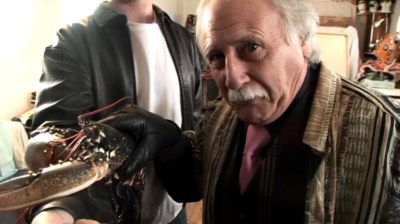
Lobster obsessed Harry
DG: Harry’s character really came from the use of the pier as a location. I’d previously filmed there as it belongs to a friend of mine, Derek Barran. I’d shot a film about five artists working on the Island and Derek was one of the artists and the pier is his studio. He’s fascinated by crustaceans and the studio is full of models of lobsters and crabs. There’s also a trapdoor in the floor of the studio where Derek places a baited lobster pot down into the sea below. He’ll quite often be successful, and of course I named the lobster in the film after him.
I wanted to incorporate some of this into the character of Harry and talked this over with Peter Tuson who plays the part. We came to the conclusion that anyone who’s this mad (and let’s face it, he’s insane) wouldn’t be a shrinking violet.
Offscreen: Compared to other gangster films, British or otherwise, your film is tame in terms of the violence. Was there ever a point in the script where you thought of making the violence more explicit or visceral?
DG: I’m not a big fan of gore. Having said that the body count in Death in Ventnor is rather high but it makes the audience laugh rather than throw up. One idea I had, but dropped early on, was that Colin and Cheryl’s relationship involved a lot of domestic violence, and though we wouldn’t see it as such each time they reappeared in the film they would bear further evidence of having physical disagreements. This would’ve worked as a running gag, but then again what’s funny about someone beating his wife up?
Offscreen: In my review I speculate that the eccentric character of Harry is loosely patterned after an equally eccentric mob boss from Performance, also named Harry. Is this a conscious decision on your part? An indirect or subconscious influence? Or completely by my design?
DG: No, our Harry isn’t based on Harry Flowers, and I think the film is probably more influenced by Ealing than anything else.
Offscreen: I can see that because I found many similarities between your film and the great classic Ealing Comedies of the 1950s (sense of locality, an air of quaintness, bumbling criminals, etc.). Is there any one in particular that influenced you?
DG: Ealing is a massive influence. The Lavender Hill Mob and especially The Lady Killers are wonderful films. These are essentially English, not really British films and if you look at a film like Passport to Pimlico it was a fairly idealized take on post-war England and I think the audiences of the day knew that. For example, if you look at the Social Workers in Death in Ventnor, there’s a kind of recognition from the audience that these people may be slightly out of whack but we certainly recognize them and I like that in films.
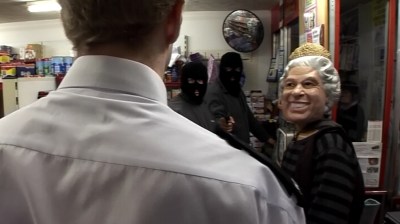
Offscreen: The film flirts with several popular genres, mainly comedy and the gangster film, but in the end perhaps it is most strongly identified as a buddy road movie. In fact, the film represents many forms of travel, bus, car, ferry, ship, and even airplane! How do you identify the film? Did the fact that it doesn’t fit into any one genre make the film hard for you to market?
DG: I think it’s more of an anti-buddy movie really. Colin has shared a cell with Billy and knows his lack of ability. Billy sees himself as a friend of the family, Colin sees him as a nuisance, there’s no celebration on his arrival at the flat As Colin says, I think rather succinctly, early on in the film “I don’t give a fuck” and he means it. There is all the travel as you say, so I suppose if I were pushed I’d describe it as a gangster/comedy/anti buddy/road movie which of course makes it difficult to pigeon-hole and even harder to market.
Offscreen: I thought the music score was excellent. I liked the way the score was partly thematic, with, for example, the dramatic orchestral piece to accentuate Harry’s bigger than life persona. How closely did you supervise the music?
DG: A lot of the music was by my eldest son Tom George and his band “Waiting for Sirens.” It brought a lot of energy to the final edit I think. Dave Priddle (who plays Gareth) is a very good musician and contributed as well, so we had different styles available. Shostakovich chipped in as well, bless him.
Characters/ActingOffscreen: I found the characters of the twins who dress alike and talk as one a fun diversion from the male dominated driving force of the film. It made me even think of The Shining at one point! I guess in a way they are a counterpoint to the eccentric Harry character, not believable but engaging. What came first: the idea of the twins or the fact that you knew them and then wrote them into the film?
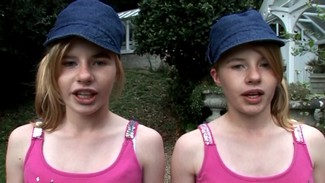
DG: The twins are the daughters of cast members Fiona and Paul Gwinnett and I wrote them in. I hadn’t thought of this but I suppose they are a counterpoint in a way to Harry. I seem to have known a lot of twins (we have them on the maternal side of my family) and I’ve always found identical twins particularly fascinating. They were fun to direct and took to filming very easily.
Offscreen: How many of the cast were professional? What sort of experience did the principals have coming into the film (film, theatre)? Are all the actors, crew, etc., ‘locals’?
DG: Apart from myself and Jill the entire cast were amateur but nearly all of them had very wide theatre experience. One of the most refreshing aspects of this is that there was none of the cynicism you tend to get with professional actors in the sense that this was not ‘just another job’. I’d declared the entire shoot an ego-free zone right from the beginning and it stayed that way. We simply didn’t have the time to indulge any shenanigans, so no one sulked in their trailer – possibly because we didn’t have any trailers. The crew were all local, apart from David White who lives over the water in Southampton. I was very lucky to have Sarah Smith as my AD. She’s from the island and had not long finished university when we began shooting. We’d worked together in the past and I knew she would take a lot of the weight from my shoulders.
Offscreen: I thought there was an interesting little subtext in the film about parenting, with the hilarious scene between Colin and Cheryl and the social worker, Neil’s twins, Harry and his ‘mommy’ portrait, and Billy’s absent parents. This somehow reflects a broader social theme that was apparent in many of the Ealing comedies. Was this simply played for laughs, or were you attempting some social commentary?
DG: As I mentioned I’d worked for a few years with young people leaving the care system. There’s an ingrained intolerance in society, certainly in this country, towards young people especially those with troubled backgrounds. This spills over, in a peculiar way, into contempt for those we employ to work with them. Social workers get a very bad press, yet we have probably the best child protection system in the world, despite woeful under funding and a shortage of qualified workers. So my sympathies are, if you like, with both sides, clients and workers. I’ve worked with some very dedicated people, and I’ve also worked with some absolute shockers. The scenes between Colin, Cheryl, Billy and Lorraine (the Social Worker) are satire of course, but they’re not that far from reality. So I wouldn’t say I was attempting social commentary as such, but Billy is the product of a system I recognize only too well. Illiterate, uncared for (except ironically in prison) and essentially unable to look after himself, he lands on Colin and Cheryl simply because he has nowhere else to go.
Finally I’d say that making Death in Ventnor was an exhilarating experience, it could’ve failed so easily, at so many times, but we rode our luck and the reward was to see it up there on the big screen. Ultimately I don’t think the audience are that interested in how much it cost, or who made it. If they enjoy it and take something away at the end then we’ve succeeded. At a screening Q&A we were asked what we spent the £2,000 budget on and replied “mainly sandwiches”. The questioner then asked “but what could you have achieved with £20,000?” and we said “well, better sandwiches” and I think that just about sums it up. It’s not about the money, it’s about the passion.
StyleOffscreen: As a general comment on the visual style, I noted a use of graphically striking compositions, like the diagonal three shot of Cheryl in the foreground, Colin and Billy in the middle/backgrounds in the opening scene, starkly symmetrical shots, interesting wide angle close-ups, etc, and that the film was always interesting to look at. This is not always the case with a film made on a small budget, where time is short, etc. Can you talk a bit about your relationship with the cinematographer David White? Did you shoot natural light exclusively? How long was the shooting schedule?
DG: Without David White and City Eye the film would not have been made. I loved working with him, which I hadn’t done before, and there was a great deal of mutual respect. David’s very adept at sizing up a scene and getting it shot. He’s very experienced in this kind of hit and run filmmaking and we all just got on with it. It’s about trust really and backing your own instincts. I always work on Hemingway’s adage that the best way to find out if you can trust somebody is to trust them. I trusted David, he trusted me and it worked.
He bought into the whole ethos of the film, and was totally committed to making it work. I think he really liked the audacity of making a film against all the odds and we gave each other a lot of freedom. I want him to shoot our next project because he combines his talent with endless enthusiasm and a love of filmmaking. I learnt a lot from him as well, he’s a good teacher, editing together was an education.
In terms of lighting we shot most of it in natural light, occasionally using a couple of reds and a lightbox. It took just over a year to shoot working mainly in very intense bursts over weekends. All pass the word over to DP David White, to talk a bit about his experience shooting the film.
David White: The first thing to say is that I am not a “cinematographer”. This is not me being derogatory or self effacing, in fact I remember a conversation where I wanted the credits to read, Camera: David White instead of Director of Photography, not because I didn’t want to own up to doing the work, but more to do with the fact that I felt I hadn’t done a cinematographers job on Death In Ventnor in the classic sense of that word. In my head there is a thin line between just shooting something and composing something. A cinematographer looks at light, thinks about what it means for the scene and the film as a whole and composes shots accordingly. Whereas on Death in Ventnor because of the time schedule and the need to always keep moving like a shark I just didn’t get that opportunity, so I just shot it. So therefore in my head I was a “camera person” rather than a “cinematographer”. That said, I think it helped the film and the very collaborative nature of the project and serviced the script, the actors and ultimately the vision of the director. The unfussy approach to shooting scenes enabled David George to really work with his cast and get the best out of them. After all this was a character piece and the characters had to shine not the camera work.
Death In Ventnor was the first time David George and I had worked together. I had met David through my day job, which is a community filmmaker. Basically that means I am a jack of all trades, I write, produce, direct, edit and shoot projects on a low budget on a daily basis. Originally I had been asked to come on board as the Boom Operative and for whatever reason on day one of the shoot I found myself standing behind the camera wondering how I got there. It was a huge leap of faith for David to take. We hadn’t worked together, we didn’t know each other’s style or indeed tastes when it came to shooting something. So we simply worked on it during the production and for me when it came down to it David was my “governor” and my job was to always make sure that as the director of the film his vision was served, whether I agreed with it or not. It is remarkable that it worked out because I can be an opinionated and David certainly knows what he wants but for whatever reason through-out the shoot we didn’t argue once about what we were doing. I think we had more disagreements when we edited the film than we did shooting it but none of them were ever shouting matches. The collaborative approach that David set up ran throughout the shoot, so when you are left alone to interpret what your director wants it only makes you want to work harder.
Because of my day job I am very use to shooting “from the hip” – on the run, grabbing what I can, thinking on my feet and using natural light. I simply don’t ever get the opportunity to light scenes, lay track or employ all those usual cinematic tricks that one associates with a film. What that does mean is that I have a learnt to get to the nub of what is going on in any scene and just get it and move on. The other advantage I think I have is that I am also an editor which comes in handy when shooting in this way. This basically means, when I shoot it is always with one eye on how it will cut. This means that you tend not to over shoot which is helpful on a low budget feature.
For Death In Ventnor my approach to composition came out of the locations we were in and the fact that this was a character piece. I am a big fan of close up shots on actors when they are talking. I like shooting through people, over shoulders, I love people in the foreground and background of shots. I like to give the actors as much of the frame to do their thing as possible. Death In Ventnor was very much about how people bounced off each other, how they react to situations. I would like to say it was all perfectly designed but to be honest all I was really doing was making sure that David got the performance he wanted and I was in the right place at the right time to get it.
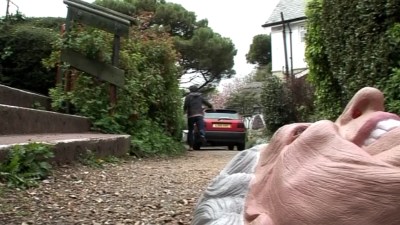
I think the only conscious time I set up a shot to have a “meaning” was outside the residential home where Colin and Billy go off to check out the post office for the first time together. I loved the fact that Colin went down one side of the wall and Billy the other and at one point they came together perfectly framed in the window. To me that represented the characters coming together to start the misadventures they were about to embark on. It was deliberate, born out of the location and really the only time I thought beyond the moment.
There was a running joke between David, Jill and myself that I never had a copy of the script for Death In Ventnor. It meant that I was able to just focus on the scene we were shooting and treat it accordingly. When you make a film like DIV over nearly a year and change of shooting weekends you have to be prepared to think on your feet, go in hand held when you need to, shoot the coverage to service the actors and the situation and get out. If you think too hard about it you would never do it. So I spent a year and a bit not thinking too hard about it, with friends and having a laugh. For me, if you are going to make a low budget film that’s the best way to do it.


